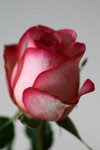Many people think that "aromatherapy" is just smelling a relaxing or pleasing aroma. So first, let's talk about what aromatherapy isn't:
- Smelling a boquet of roses, while enjoyable, is not aromatherapy.
- Using synthetically scented air fresheners, despite what the packages may claim, is not aromatherapy.
- Using lavender soap in the shower is not aromatherapy.
Essential oils are the primary and most important substances used in aromatherapy. Essential oils are made by extracting volatile oils from organic plant matter. Some common essential oils are: lavender, extracted from lavender flowers and stems; lemon, extracted from lemon peels; eucalyptus, extracted from eucalyptus leaves; frankincense, extracted from tree resin.
Essential oils are used in many ways, in addition to simple inhalation. Aromatherapy application methods include diffusion for inhalation, steam inhalation, dilution in a carrier oil for massage, dilution in the bath, use in a masque or salve, among others.
Essential oils are also used as fragrance ingredients in beauty products and perfumes. In these cases, the essential oil often is used for its fragrance properties. While essential oils may make the products may smell nice, in nearly all cases there is no significant medical "therapy" taking place when these products are used or applied.
You may still be wondering: why might I want to use essential oils, and what are the health benefits of aromatherapy? Many people have used aromatherapy to help relieve problems such as head and chest congestion, fungal infections, muscle pain, anxiety, and acne.
Last, but not least, it is imperative to familiarize yourself with safety guidelines before you begin doing any aromatherapy on you own. In most cases, essential oils should be well diluted in a carrier oil, such as almond oil or even olive oil. There is always the potential that an essential oil could cause an adverse reaction, and it is always possible to become sensitized to essential oils. Please do your research before using essential oils.
If you're ready to start exploring the world of aromatherapy, browse the Essential Oil Encyclopedia or delve into Aromatherapy Recipes.
Recommended Resources ~
More Aromatherapy Basics:
- Introduction to Aromatherapy: Aromatherapy 101 Article
- Wikipedia: Aromatherapy
- Benefits of Aromatherapy
Aromatherapy Extraction Information:
Aromatherapy Application Methods:
Health Benefits of Aromatherapy:
- Aromatherapy Health and Beauty Database
- What Does The Research Say About Essential Oils?
- Guide to Aromatherapy Research and Resources
~

2 comments:
Hi Amie,
Firstly I'd like to compliment you on the wonderful blog you have created here. I've enjoyed it thoroughly and will return often!
Secondly, I felt compelled to add my opinion on the beginning of this entry, in particular "Smelling a bouquet of roses, while enjoyable, is not aromatherapy" and "Using lavender soap in the shower is not aromatherapy".
I can see that you're leaning more toward the physical healing benefits of essential oils as you state further down that essential oils are used in many ways, in addition to simple inhalation, so I found these two examples to be false by saying they're not aromatherapy.
From my own learnings, I've been taught that aromatherapy works on many levels - not only of our physical body - but emotionally, psychologically & spiritually.
From the NAHA website: "Aromatherapy can be defined as the art and science of utilizing naturally extracted aromatic essences from plants to balance, harmonize and promote the health of body, mind and spirit."
Using soap infused with lavender essential oil from my understanding is a form of aromatherapy. Your body absorbs small amounts of the oil through the skin as it would with massage. You also gain wellbeing through inhaling the scent - aiding our mind and emotions.
Before oils and essences were made to be marketed, many people, especially tribal people, would sit amongst particular plants when ill and inhale their aroma to aid their healing. They would also emerge parts of the plant in water or float flowers, then anoint the body with the infused water.
So, the scent of a rose can be extremely beneficial for healing, if this is what the person is needing. A rose has it's own energy that is healing in it's complete form.
Once again, thank you for an interesting blog and I hope you haven't taken my opinion in a negative way. Have a great day! :)
Hi there, thanks for an interesting comment.
I don't consider smelling a bouquet of roses to be aromatherapy because it takes thousands of pounds of rose petals to produce a fraction of an ounce of rose essential oil. There is nowhere near enough essential oil in a dozen roses, let alone volatilized from those roses and into your nose, to be considered therapeutic in a medical sense. Similarly, it is doubtful that there is enough oil in the very miniscule amount of soap that contacts your skin - or enough time for it to penetrate in the few seconds before the soap is washed away - for therapy in the medical sense to take place. And I don't believe this is analogous to aromatherapy massage, where there are two therapies taking place, and adequate opportunity for true absorption of the essential oil.
In my opinion, claiming that using lavender soap in the shower is "aromatherapy" perpetuates misconceptions about aromatherapy and does a disservice to those who are working to gain more acceptance for aromatherapy as a legitimate modality of complementary medicine.
Post a Comment